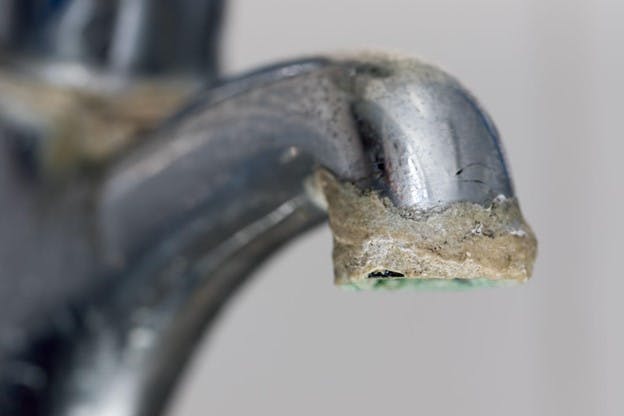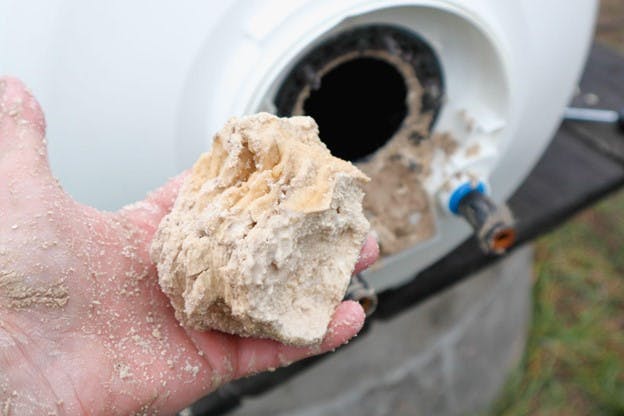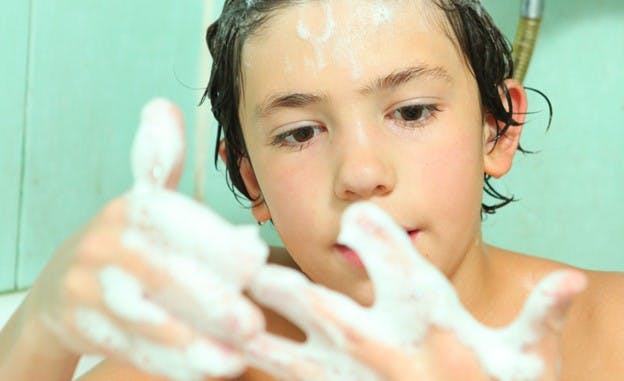September 2023
Can a Water Softener Fix My Eczema? A Science-Backed Answer
Your skin is your largest organ. It protects you from all sorts of sketchy stuff, helps you regulate your temperature, and it holds you together in a nice package. Your skin is the first thing people see when they look at you and it’s how you interact with the rest of the world.
There’s a lot that’s been said about being comfortable in our own skin but if you’re dealing with a skin condition like eczema, this takes on a new meaning. While everyone’s skin is fighting a daily battle against the elements, people with eczema might feel like their skin isn’t always winning. Giving it every advantage is important.
One such advantage could be using softened water for showering and washing your clothes. There are now several studies that suggest hard water could be a catalyst for developing and aggravating eczema, so it’s normal to find yourself asking, “Can a water softener fix my eczema?”
And the answer, of course, is maybe. There are many factors that could play a part. In this article we’re going to look at what hard water is, why it’s possible for it to irritate or cause skin conditions like eczema, and most importantly, find out if it can help to fix your eczema.
What Is Hard Water?
Hard water is a term that gets thrown around a lot, but you might not know what it means exactly. The hardness of water has to do with the concentration of calcium and magnesium ions in the water.
Water travels through mineral-filled rocks and soil on its way to your tap. As the water breaks down those minerals, they are absorbed into the water and carried along. These tiny mineral ions eventually find their way into your pipes, your water using appliances, your surfaces, and your skin.
While hard water minerals like calcium and magnesium aren’t dangerous to ingest, these millions of microscopic mineral chunks tend to build up on surfaces and change how water interacts with soaps and detergents.
The white, chalky build up on your bathroom tiles is hard water minerals being left behind on surfaces. You can imagine then what it might do as it builds up on sensitive skin.
The effects of hard water also:
- Clog and corrode pipes with limescale buildup
- Make water-using appliances work harder while being less effective
- Leave mineral spots on surfaces like the white spots on your car’s paint after you wash it
- Damage and fade clothing fibers
- Give bacteria a place to grow as it builds up on surfaces
- Create soap scum buildup
- Cause soaps, shampoos, and detergents to not lather as easily, meaning you need to use a lot more of it to get the same effect
- Dry out skin and clog pores
What Does a Water Softener System Do?
A water softener uses ion exchange technology to replace hard water minerals with small amounts of sodium or potassium. Then about once per week the water softener will regenerate itself and flush the captured minerals out with the wastewater.
If you have hard water, installing a water softener with the right amount of grains can be a life-changer for so many reasons.
What Is Eczema?
Eczema is a fairly common family of inflammatory skin conditions. Although there are seven different types of eczema, they all usually cause symptoms like skin irritation, dry skin, scaly patches, rashes, blisters, itchiness, and infections of the skin. None of them are contagious.
The different types of eczema are atopic dermatitis (atopic eczema), stasis dermatitis, contact dermatitis, seborrheic dermatitis, dyshidrotic eczema, and nummular eczema.
The development of eczema can happen at any age from newborn to over 50. It can be mild or severe and the flare-ups can last days, weeks, or longer.
Dermatology offers many treatments for eczema symptoms like steroidal creams, lotions, and ointments but as of now there is no cure. If something is irritating or causing your flare-ups, getting rid of it can go a long way in treating the disease.
What Is the Cause of Eczema?
There are many types of eczema but the cause of the most common type is an overactive immune system. When an environmental irritant comes in contact with a person with eczema, it can trigger the immune system to overreact, which can thicken the normally healthy skin barrier. This thickened skin barrier becomes dry and itchy.
Various environmental and even emotional stressors can trigger these flare-ups or make them more severe.
It is suspected that some causes of eczema could also be genetic. Not having enough of the filaggrin protein can cause dryness of the skin. Filaggrin usually helps healthy skin to maintain its moisture but it has been found that some people with eczema are in fact deficient in this vital protein. Having family members diagnosed with certain types of eczema could put you more at risk.
The overall cause of eczema still isn’t fully understood.
Is There a Cure for Eczema?
Dermatologists offer many treatments for eczema but there is no cure. If you think you have eczema, make sure to get it diagnosed because it is often mistaken for psoriasis and other skin conditions.
Can Hard Water Cause Eczema?
Hard water can irritate and cause dryness in healthy skin and it appears to be a risk factor in developing eczema too. Hard water minerals can build up and damage the skin barrier. Calcium can also react to other common chemicals found in soap which can increase the likelihood of developing eczema.
This can be made worse if your water also has a high chlorine content. If you’ve ever spent time in a chlorinated swimming pool, you know the drying effect it can have on your skin and hair. Most public water supplies do use chlorine and chloramines to disinfect water.
Hard water is also more alkaline than skin. Washing in hard water can disrupt your skin's acid balance and its ability to fight off bacteria, causing it to be overrun with infection-causing bacteria.
A recent study on newborns in hard water areas suggests that a water softener made it significantly less likely for the baby to develop eczema.
While there’s still plenty of studies to do, preliminary research is indicating that hard water isn’t a friend of healthy skin.
Can a Water Softener Fix My Eczema?
At this time, eczema doesn’t have a known cure. However, it can be brought on by many different things and one of those could be hard water. If your eczema is being caused by or irritated by hard water, it’s possible a water softener could reduce or eliminate flare-ups.
Installing a water softener or moving to a place with much softer water are the only ways you’ll know for sure. The good news is, if you’re dealing with hard water, potentially easing the symptoms of eczema is just one of the excellent reasons to soften your water.
An All-In-One Whole Home Filter and Water Softener Combo removes both hard water minerals and skin irritating contaminants like chlorine from every tap and shower in your home.
What Are the Disadvantages of Soft Water on Skin?
As far as we know, there are no disadvantages of using soft water on skin. Some people raise concern about the salt used by water softeners to remove hard water minerals, but the amount of salt used is miniscule and there is no evidence it can cause harm to your skin.
Another concern some people have centers around the fact that when washing in soft water, you’ll notice a slippery skin sensation. Some believe this is because soap is harder to rinse off in soft water but it's actually the opposite. In hard water, minerals mix with the soap and begin to form soap scum right on your skin. This gunks up the soap so it no longer feels slippery. Many people mistakenly take this as a sign the soap has been fully rinsed off when it hasn’t.
Soft water gives you a truer gauge because it doesn’t create soap scum. Also, because minerals damage soap’s ability to lather and clean, you need far less soap when washing in soft water. Many people who are used to having hard water will use too much soap, which can also be bad for their skin.
Does Water Filtration Help with Eczema?
Tap water in the U.S. and Canada is generally considered safe based on minimum contaminant reduction guidelines. The U.S. EPA regulates about 90 contaminants but there are thousands we don’t know about and many of the ones that are regulated haven’t had the guidelines revisited in decades.
The guidelines they do have are mostly created for people with healthy immune systems. As eczema is mostly an autoimmune disorder triggered by environmental factors that we don’t fully understand yet, it is possible a high-quality water filtration system could help.
That said, HomeWater filters are not medical devices and we are not doctors. If you believe something in your water could be causing your eczema, we encourage you to discuss it with your doctor.
Softer Water Could Give You Softer Skin
While we don’t know the exact cause or the cure for eczema just yet, there does seem to be some common irritants like hard water which can make it worse.
Water softeners, like water filters, can help dramatically improve the quality of the water you use to drink, bathe in, and wash your clothes in. And this can have a positive benefit to your health. Soft water can help you avoid all the skin-damaging and drying traits that come with hard water. But unless hard water is the sole cause of your skin problems, it's unlikely that a water softener will totally fix your eczema.
At HomeWater, we pride ourselves on making water softeners and filters that will provide you with the highest quality, best-tasting water you can get anywhere. Our UPSTREAM 4-Stage Whole Home Water FIlter with a Salt Free-Water Conditioner Add-On will protect everyone tap in your home from hard water minerals, particulates, heavy metals, chlorine, VOCs, PFOS/PFAS, microplastics, more!
If you’re not sure what the right filter or softener is for you, try our fast and free filter quiz to get matched up with your perfect system today.
Related Articles
September 2023
What Are the Benefits of Catalytic Carbon Filters?
September 2023
Are Healthy Kidneys and Water Quality Linked?
September 2023



